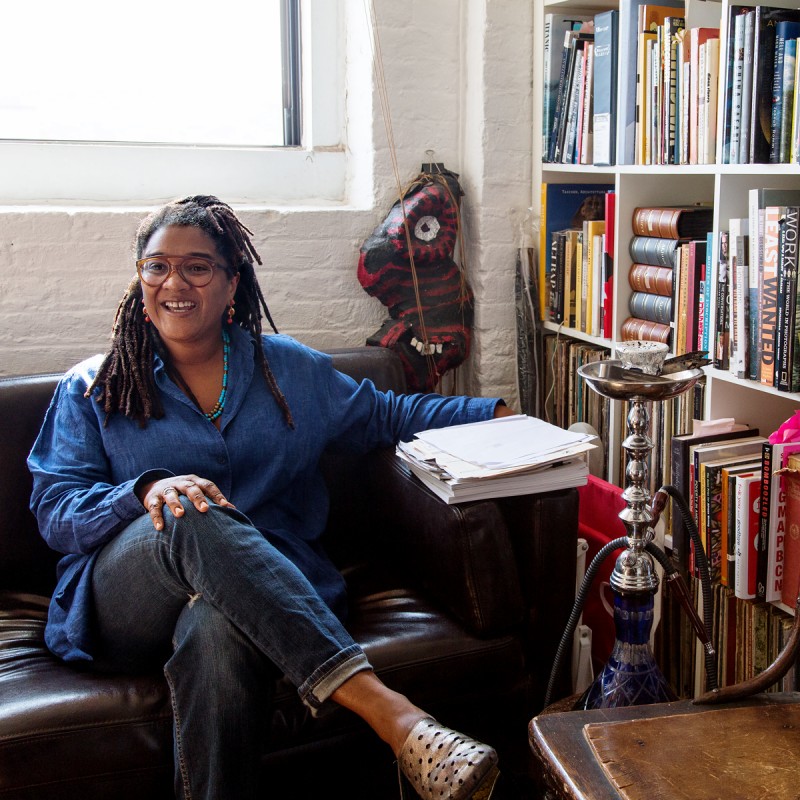An Interview with Lynn Nottage
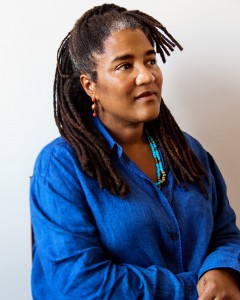
Written by Victoria Myers
Photography by Emma Pratte
October 14th, 2015
At The Interval we have a giant spreadsheet that lists all of the season’s current and upcoming shows along with anyone involved with them who could be a potential interviewee. At the top of this spreadsheet we have a section titled, “People We Should Interview If They’re Doing a Concert, Special Event, or Basically Anything We Can Use As An Excuse.” Lynn Nottage was in that section of the spreadsheet. Obviously, being a Pulitzer Prize-winner doesn’t hurt, but what really made us want to talk to Lynn was the breadth of her work—from a play like Intimate Apparel (which can even be good if you’re seeing a college production—believe me, I know) to Ruined to By the Way, Meet Vera Stark. So, we were delighted to hear that her new play, Sweat, which premiered at the Oregon Shakespeare Festival, would be traveling to Arena Stage and then to NYC in the fall of 2016, giving us an excuse to talk to her. We got the chance to speak with Lynn at her workspace in Brooklyn about her experience going to Reading, Pennsylvania to develop Sweat, her process as a writer, being socially engaged, and so much more.
(i.) Present
Let’s talk about Sweat, since it’s coming to DC and there are rumors it’s coming to New York.
It is coming to New York. It will probably be in New York in the fall of 2016.
That’s awesome. For Sweat, you went to Reading, Pennsylvania and interviewed people.
I went to Reading and it was developed similarly to Ruined. I went and immersed myself in a community, and based on the conversations I had, you have Sweat. It’s a work of fiction. It’s not verbatim theatre and it’s not meant to live and breathe that way.
Do you have a process for interviewing people when their responses are becoming a work of fiction rather than a work of journalism?
We go in and try to be completely transparent with them: I am not a journalist, I’m a playwright, and I’m developing a piece that is creative and not going to be solely based on their lives but inspired by conversations that we have. But, that said, this entire process with Sweat was a little different because there are two stages of it. One stage is Sweat the play, which was commissioned by the Oregon Shakespeare Company as part of the American Revolution Cycle. And the other part is when we were in Reading we got very close to people and didn’t want to feel like carpetbaggers, and didn’t just want to go to regional theatres and New York and tell the stories, but we also wanted to put something [together] that could live and breathe and be in conversation with itself. So we said we were going to do an installation that could live in Reading.
Was that second part of it something that formed as you were going or something that you knew you wanted to do before you started?
I think when I first entered into Reading I had no idea what it was that I was going to do. It was just that this city was labeled the poorest city in America and that it was in the Northeast. It was once a real powerhouse because it was a center for textiles and steel and the Reading railroad was there, and then it had this absolute collapse. So I was interested in what happened to folks and where did the middle class go and how were folks struggling to resurrect their lives? And I didn’t know the endgame. It was just curiosity that drew me. And once I’d been going there for two years, I became very attached to them and wanted to do something that lived in that city rather than traveled outside of it. So it really is the idea that over the course of two years, it came to fruition.
Was there a moment while you were there when you had a realization of, “Ah ha! That’s the play!”?
No, there was no moment. I still don’t know. Particularly for the installation, we’re still trying to find it. What we’ve settled on is that it’s going to probably be in a supermarket because of the symbolic resonance of that, and that it’s located downtown and it was never occupied. We want to tell the story of at least eight to ten people and have those stories be a microcosm of what everyone is going through. We want to, at the end of the piece, have something that puts the audience in conversation with each other. We want to invite the audience to respond to prompts, and that will ultimately be woven into the fabric of the piece, so people can continue to come over time and it will continue to evolve.
The play takes places in both 2000 and 2008. How did you wrestle with form matching content? How did you decide that was the structure you wanted for the piece?
I wanted two generations to be in conversation. And I wanted to understand how the impact of the parents’ choices played out in the lives of their children. And so that’s how I came upon the two time periods. So it’s set in 2000 and 2008 and it begins with a very cohesive group of people who are slowly fractured over a period of time, and then in 2008, you see all the repercussions of the choices that they made in 2000. So that’s how the structure took shape.
With a play like Sweat, do you think about the delivery system of the dialogue and that the audience might come at certain characters with certain biases?
The thing is, I can’t control that built-in bias because it’s going to exist. What I can do is reflect the world through my very unique prism and perhaps people will be able to relate. I can’t control how it’s received, nor do I want to control how it’s perceived. What I want is for people to go into the theatre and in some way their perception is shifted, so that if they do enter with their biases, perhaps they won’t leave with them.
Was there anything, particularly with this play, where you had incidents of people misinterpreting something based on who was saying it?
It’s interesting, because the life of this play is we had three previews and then it opened, and then I was gone, so I haven’t had the benefits of seeing the play live and breathe in front of an audience, which is a slight frustration and a very unusual experience for me. But just in the tiny bits of feedback I did get, what surprised me was there’s one scene—the opening scene—where you have an African American parole officer who is speaking rather harshly to a white man, a white supremacist who has white power tattoos on his face, and he’s being quite confrontational with the parole officer. The parole officer is being kind of confrontational back, and I was really surprised by some of the audience members, particularly white men, who said, “Well, don’t you think the way he was treating him was kind of reverse discrimination?” And I’m like, “Absolutely not.” And that really surprised me. It surprised me that they were not concerned that this white man was using certain unforgivable language to this black man who was in a position of control and he was exerting a position of control in return.
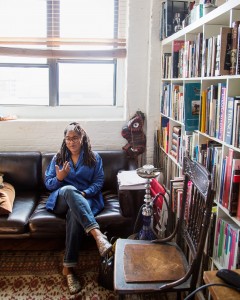
(ii.) Social Engagement
In another interview, you mentioned that it’s very fitting that there will be productions of Sweat going on prior to the Presidential election. So I wanted to ask you about the socially engaged part of theatre, because it’s a little counterintuitive. On one hand, theatre is live and responsive, but then you have season planning and play development that can make it not very dexterous to things happening socially. How do things remain in conversation with the world around it when there’s a good chance that the world around it has changed in the years of development?
You know, the sad thing about Sweat is that it’s an ongoing conversation, and the fact that the middle class continues to be chipped away. Unfortunately, I think ten years from now we’ll still be having the same conversation. But it is hard with the development process. At the time of the inception of the play you think, “Oh, this is an idea that I want to say right now,” but then it takes it two years to get to an audience and you fear that, by the time it gets to an audience, it’s not going to have social relevance. But I think it’s worth taking a chance. I felt that this piece, which was supposed to be about history when it was commissioned, my assumption was I’d be looking back at a time that we’re no longer in the midst of and, unfortunately, it’s not the case. And, just in terms of social engagement, I think of myself as a playwright who is socially engaged. It’s important. I get very frustrated when I go to the theatre and it feels like we’re in some sort of bubble that has no relation to what’s going on in the world. I don’t understand it. I don’t understand how young playwrights choose not to be actively in conversation with the culture. I don’t understand how theatergoers can go to the theatre and not want to have more active and rigorous conversations with what they’re seeing on the stage. It’s just a frustration that I have. And sometimes I see reviews where the critic is critical of the playwright for being social engaged or writing quote-unquote “idea plays.” But I don’t think it’s a bad word, nor do I think political theatre is a bad word. I wish it was a word that was bandied about more, because I think if it were bandied about more there would be more of it.
Do you think part of the problem has to do with how theatre is being taught in colleges and universities?
Perhaps. I can only speak to the experiences that I have. I have a class, which is called American Spectacle, where we look at theatre outside of the proscenium, and I’m pleasantly surprised that the kids do want to be more socially engaged and they welcome that in the classroom, because I think they’re not asked to do that that often. I think there’s a real hunger and I feel that now more than I did five years ago. I think it’s great. I feel like there’s more frustration out there. I feel like there’s more of a need to be heard. I feel like there’s so much detritus out there on social media that it’s really easy to get lost and for your voice to not rise to the top, and I feel them pushing up and trying to be heard. I think that’s particularity true of my female playwrights and my playwrights of color who continually feel marginalized.
(iii.) Process
Do you find you have a usual process for writing or does it change with every piece?
I find it changes with every piece. I approach each play that I write as a new adventure. I love to travel and I like to go off the beaten path and I think I’ve used that same philosophy with writing. I don’t want to write the play the same way, otherwise I’ll get bored.
Are there any other areas of culture that inspire your work?
Definitely. If you come to my house, it’s sort of wall to wall art, and sometimes I’ll just go into the living room and sit and look at all these fabulous things that artists over the ages have said, and feel inspired and awed and insecure and all of the things you feel when you’re in the presence of people who are quite genius artists. Whenever I begin a play, I always make a soundtrack, and that soundtrack is what I write to for the entire play. So for the beginning of Sweat, I spent like two weeks listening to music and picking songs and placing them where I wanted them in the order, and that’s what I wrote the play to. I did the same for By the Way, Meet Vera Stark and Intimate Apparel, and every play. That’s the foundation that I build from.
Do you use music that’s all from your iTunes library and songs that you know evoke certain things for you? Or do you research the music that you want to use and search for brand new things?
It’s both things. Sometimes they’re songs that are my favorites in the iTunes library, but for others, I have to go in search of them. For Sweat, because it takes place in a part of the country that I don’t live in and it’s a group of people that are very different from myself, I thought about what would they be listening to and what excites them and what are my characters’ favorite tunes, and I try and put those on my soundtrack. So some of the music may be music that’s really different than my favorites, but they’re evocative of the mood of the piece or the place where the characters are in their lives.
(iv.) Themes
Do you see any themes in your work?
I’m beginning to see some themes in my work. I think I definitely gravitate towards characters who have been marginalized in some way in their lives and are grappling with identity. But it’s not a question I’m often asked. People overlay.
Has there been a time when people have talked about themes in your work and you’re like, “Nope, not correct”?
You know, I’ve heard people say things and I think, “That’s totally wrong. That’s not why I wrote the play, but it’s interesting that you think that.” It’s kind of weird. Or even more so when you read some of the criticism that critics write and you feel like you want to write to them. And once I did. It was so, so petty. In Meet Vera Stark there’s a film. Aspect ratio of films in the 1930s is very different than the films shot today, and we knew that, but the director made the design choice to shoot it in a cotemporary aspect ratio so that it would fill the stage. One critic spent all of this time complaining about aspect ratio and how we didn’t know. And I thought, “Of course we know. It’s theatre. It was a choice. We took license.”
Do you think he would have spent that much time talking about that if you were a male playwright?
In that case, yes. I don’t think that had to do with gender.
Something that comes up a lot is whether people feel their work is talked about differently than it would be if they were a male playwright.
I was thinking about this today in terms of as a writer, in terms of what I feel I’ve accomplished is the way in which my work is discussed. Every time you write a play it’s like you’re an idiot savant and someone put a pen in your hand and you created this work and no one knows how it happened.
That’s come up in various ways. You’re the first one to put it quite like that.
That’s how I feel. Like there’s almost surprise that the work is accomplished and complicated and entertaining and interesting because, god forbid, it’s written by an African America woman. I don’t know what folks are expecting, but it does sometimes hurt my feelings that the work isn’t taken as seriously. [People act like] it just spontaneously writes itself, and not understanding that there’s a great deal of thought and craftsmanship that goes into the creation of the work.
I wish someone would do a study for theatre where they actually look at the adjectives used to describe work by women vs. men. They’ve done it for other industries and always find work by women is described differently and that we don’t attribute intelligence to women in the same way.
I think it’s definitely true that there are different adjectives that are used when critics are speaking about the work. The work is seen as precious. The work is seen as delightful. There are adjectives you just don’t see when you’re talking about the work of Arthur Miller or David Mamet. Even though the work can be equally as tough. Even a play like Ruined, which is tough, isn’t spoken about the same way.
That’s insane.
It’s kind of insane.
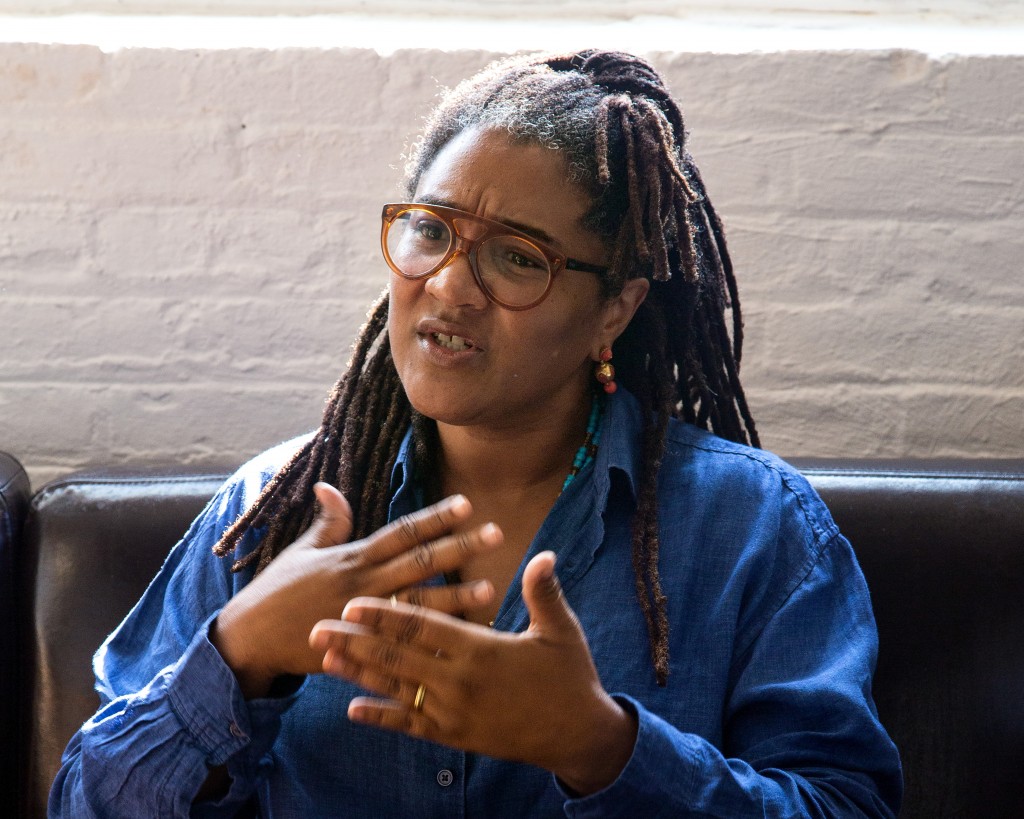
(v.) Past
What was the first piece of storytelling that inspired you?
I think that the first piece of storytelling that inspired me was my grandmother who was one of the great raconteurs. She was a master storyteller, and from the time I was really young we all sat rapt at her knees. In many ways, I think if she’d been born in another generation she would have been a theatre artist or a writer. She was a woman who I saw graduate from high school and graduate from college, so she really came into her power quite late. But she was a very gifted linguist and a very gifted storyteller. So I think that she’s the one who probably pulled me into theatre.
When was the first moment you felt like a grown up?
Two moments when I felt like a grown up: when I pushed my child out and I held her to my breast and I thought, “There’s another life that’s 100% dependent on me.” And two, when my mother died, which happened within the same month, and I thought, “Now I’m the matriarch.”
Was there a moment when you felt like, “I’m a playwright”?
We keep circling back to women writing, and I think it’s really harder for us to wrap our tongues around that word “playwright.” It took me a really long time to embrace the notion of being a playwright. Just because I thought men are playwrights, and women write plays as a hobby. I think, as a result, I didn’t embrace the notion of being a playwright until I was older—probably my mid to late 20s—even though I’d gone to graduate school as a playwright and had written plays, I still didn’t feel like I was.
Can you speak a little bit more about that? We hear a lot about in childhood, people looking back and thinking things like, “Oh, I didn’t see women writing so I thought I’d be an actress.” People talk less about what you’re talking about, but I think it affects a number of women.
I had already gone to grad school and I was a playwright, but as for when I embraced being a playwright, that took longer for me to feel comfortable even saying it. I think it goes back to having so few role models. When I began writing, the landscape was really different. There weren’t plays by African American women getting produced at all. And if they were produced, they were produced in smaller theatres, and marginalized. You weren’t seeing women getting plays produced on the main stages. If there was a play produced, it was produced on the second stage and it was produced during the shortest month—February—or the end of the season. So to even take ownership of being a playwright was very difficult because I thought, “How am I going to do this? There’s no opportunity for me out there.”
(vi.) Diversity
Speaking of diversity, it’s something the theatre community is starting to talk about more, but how can it be talked about better?
Well, I think we have to stop talking about diversity. My father-in-law very recently wrote me an email and said, “My Buddhist group is going to talk about how to talk about diversity but there are no people of color in the group. What do you think?” And I said, “Well, you’re not really talking about diversity then, are you?” I think there has to be more action. I think we’re at the phase where we’ve sort of talked it to death and now we have to implement some of the things we’re talking about.
Do you feel like one of the problems with the diversity conversation is that we contextualize it wrong? We contextualize it through the lens of conservative racism, but really in theatre we’re dealing with a sort of “good, liberal people” racism, which manifests itself totally differently.
I do think that’s true. I think that when you talk about liberal racism you have a lot of theatres that will host panels, that will have convenings to talk about it, but when you look at their seasons they’re not practicing what they’re preaching. For years we used to joke that they’d give us commissions but they wouldn’t give us productions. They seem to think it’s enough to offer someone a meal without inviting them to the table. And that’s what I think the real problem is. It’s not just institutions, it’s the culture at large doesn’t really understand how to embrace the democratic promise and the democratic promise is that there’s equity, and we don’t get that.
It’s like when everyone makes their Facebook status about something rather than actually doing anything about it.
Yeah, like my daughter said, when something happens, suddenly everyone is outraged, but she’s like why don’t you practice what you preach. If you see something you think is racist, say something. If you experience racism, say something. But she says too often people really don’t practice what they preach.
It seems like the social media aspect of it almost gives people a really easy way to do nothing under the guise of doing something. It’s like when you see these posts that are like “Why is everyone on my newsfeed talking about x instead of y?” Well, your newsfeed is a completely curated list of people you’re choosing to follow. And if you have a problem with those people you could try having a conversation directly.
Or change who you follow. Expand your list.
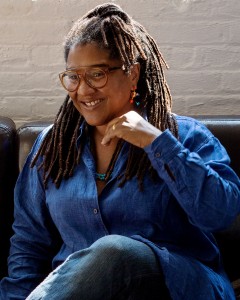
(vii.) Canon
Something we talk about a lot is the idea of the American Theatre and I feel like no one really knows what we’re talking about with that. To you, what is the American Theatre?
I can say what I think the American theatre should strive to be, which I think is a reflection of the beauty and diversity of this culture. I think that we fail to live up to it, but I think that’s what American theatre should be: a real reflection of what’s happening today. I just wrote this introduction to an Arthur Miller anthology and one of the reasons that I did the introduction was because I thought it was really important for us, as women, to be in dialogue with that part of the conversation, because Arthur Miller defined what American theatre was in the 20th century. He was someone who understood that you really had to be socially engaged in order to be a writer. I think about all of the writers who we consider to be part of the canon that was so defined by white maleness, and that has to shift in the 21st century.
Even sometimes being able to reinterpret things or interpret them differently than they have been.
I think it’s really important for us to talk about the writers of the past, since so often you have white men talking about white men. I think for me, as a black woman, to read these plays and write about my experience reading them as a black woman, is very different than any other introduction that I’ve read of Arthur Miller. It’s reframing the canon.
(viii.) Development
Is there something you think can be done to improve new play development so it’s less about development and more about production?
That’s an interesting question because the plays do need to be developed before they’re produced. So development is necessary, but too often I find people get lost in the development ghetto, and they can drift there for five years before they even get a taste of their first production. I don’t know what the solution to that is other than more opportunities to produce, but some theatres are shrinking their productions. It used to be that theatres did five productions, and now they’re doing three and building in extensions for those three productions, but it means there are fewer opportunities for playwrights. There are two less productions spots for playwrights. I think some of it is the economic realities, since theatre is getting more and more expensive to produce even though it’s shrinking, which is paradoxical to me. Plays are smaller and yet they’re more expensive to produce.
It’s so weird next to film and TV, which is getting cheaper because of the technology, and that makes way for more voices and more outlets. And theatre is going the opposite direction.
It’s the opposite direction. But the fact is, to put on a show, you need a certain number of people in that space every night and that doesn’t change. Unless the demands of the audience changes. But unfortunately the demands of the audience are greater: they want to be razzle-dazzled and that costs more money. But in terms of new play development, I think one of the problems is that there’s a playwriting glut. There are too many playwriting programs in graduate schools to service the demand. There are not enough slots for all of those people to become professional playwrights. A lot of those people are talented and end up in the development ghetto.
Do you think part of the problem has to do with how we engage the audience about new play development? Especially with theatres that have subscribers and donors, and those people might think they’re doing a good thing by helping development programs rather than knowing playwrights actually want something else.
A lot of times the audience is just ignorant about how plays are developed and produced. I think that artistic directors are using the development slots in many different ways. One is to say to the funders, “Yes, we have diversity,” so they’ll give readings to women and people of color and place them in those slots, knowing that they’ll never produce those plays, but so they can say, “We’re supporting and nurturing these playwrights.” So I think that’s one way they use it. Two, I think the really smart producers are using it to educate and introduce audiences to new work and say, “You liked that? Try this.” So before putting it on the stage, it’s teaching them how to interface with work that might be different, which I think is very smart.
Do you think another problem is that we group all “other” as one group?
For many years there was the other spot, and it almost didn’t matter what the person of color was—it could be black, Asian, or Latino—and they felt like they’d reached the quota, rather than a season that was really reflective. And that each group is very different and has something different to say.
In The New York Times the other weekend there was that whole section on TV, and one of the articles was on audience engagement and all of the ways TV shows have really tapped into social media with that—things like cast members tweeting, behind the scenes stuff—and it’s really fostered more engagement with the programming.
I think theatres can be much better at the way they draw audiences into the theatre. When we were doing By the Way, Meet Vera Stark, I was talking with the theatre because I saw the piece as a trans-media piece so it was like, “What if we begin the play before people even come to the theatre? And what if they tweet and they have a Facebook page?” They didn’t tweet, but I had one character who had a Facebook page and people could engage with it and he made a documentary, and all of that was really fun for audience members who discovered that on their own and in some instances we directed them to it. I think there are so many ways theatres can invite people to participate in the play before and after and, for whatever reason, we’re not doing a great job. Though there are individuals who are brilliant at doing it, like Lin-Manuel Miranda, who is like the loveliest and friendliest tweeter, and it’s great for his productions. People can go see his show and then tweet him and he’ll tweet back and then they feel like they’ve made a connection, which is something that I think is happening with film and television—they feel like they can touch the characters. But I think of theatre as being analog, so there’s half of me that believes all of those things but then the other half is like, “Oh but we should keep it pure,” and let the experience be what it is, and that you have to travel and suspend everything else that’s happening in your life and really be present for it, which I think is part of the beauty of it, without all of the noise that’s created by social media.
I was about to ask about the flip side of that. The idea of accessibility can have a negative side to it, since you can give people too much access. And maybe especially if you’re a female writer.
I think as women, we always have to be careful since there are so many prowlers out there and I think we can be particularly vulnerable. But I think men have been so good at it and so good about the cult of personality for so many years that there’s no reason we can’t occupy that same space. We have to be really good at putting our names out there in big bold letters and saying, “This is who I am,” and be unapologetic about our voices. But the flip side is you don’t want someone to come to your house and tie you up with duct tape.
And here I was just going to say something about the expectation on women to be very friendly.
I think that’s not true of black women. We’re always told that we’re not friendly. There’s not that expectation. I feel like it’s the opposite. People are like, “Why are you so angry?” And I’m not angry, that’s you projecting on to me. I can literally be in a neutral state and they’ll be like, “Oh she’s really angry.” Next time you interview a black playwright ask them if people think they’re angry and they’ll probably go on a whole diatribe about that. I think there’s a lot that’s projected on playwrights of color—before you even introduce yourself, when people go see your plays, when people sit down to interview you. I think that there’s more baggage that’s brought.
(ix.) Being Heard
Do you feel more pressure to succeed, either internal or external, than if you were a male playwright?
I think I have more of a desire to be heard and recognized and acknowledged perhaps than my white male counterparts, just because our voices have been so marginalized, and I feel like there’s been a tremendous absence of women of color in all of the mediums. I don’t really strive to be successful, I strive to be heard.
Do you feel like you have less room for failure?
I feel like there’s always room for failure in one’s life. I’ll tell you what I was taught: I was taught you have to be twice as good in order to succeed because you are an African American woman. Because if you’re just good, you won’t be seen, so you really have to strive to be better.
Childcare is something that people are starting to talk more about. Of course, part of that is always the thing of, if you were a man, you likely wouldn’t get asked about childcare.
I don’t mind talking about it because I think it’s fundamental to who we are and the realities are different. And I think women enjoy talking about childcare and children because it’s something that makes us unique, since we spend nine months with something, we push it out, and then we spend the next 50 years raising them. And that’s part of the struggle. Of course, theatre can improve on this. I think theatre can make the landscape more comfortable for women to roam, and one of the questions is, “How do we make it more accommodating for women with children?” I was in Oregon for two months with Sweat with the director, and both of us have two children, and we deliberately decided to do the play during the summer since we could bring our children with us and we wouldn’t have to worry about, “Are they missing us? Are they being fed?” All of that stuff which takes you out of your process.
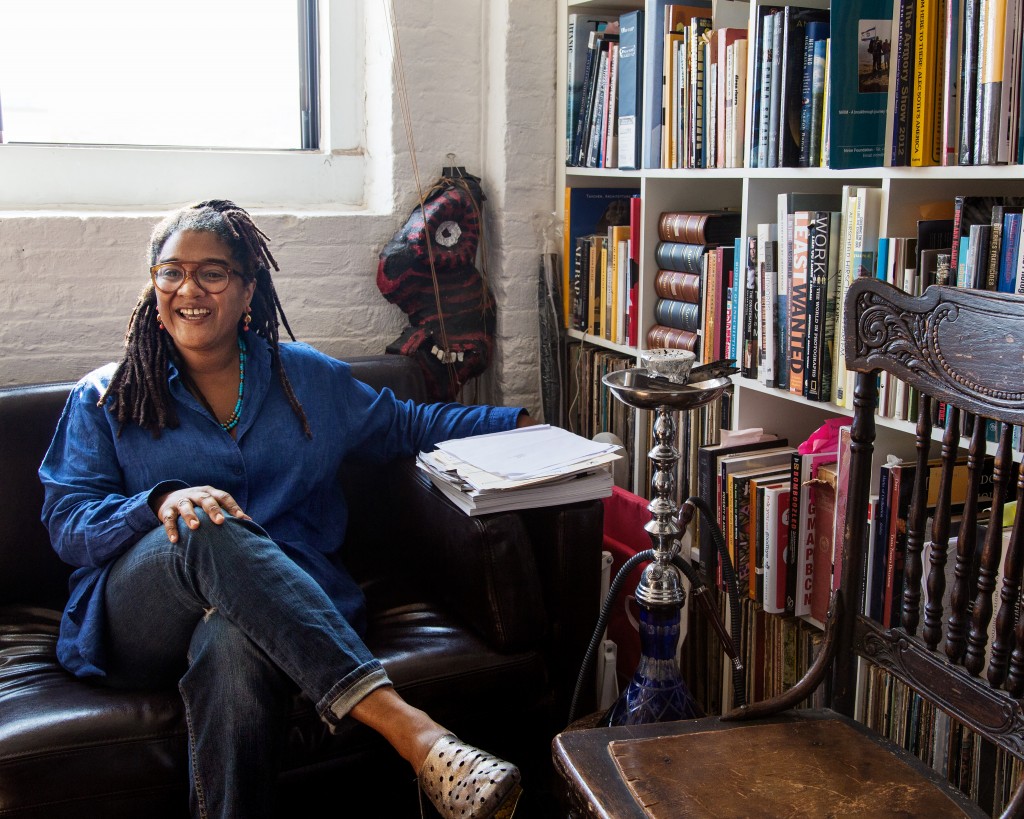
(x.) Future
What’s something you think people can do to improve gender parity in theatre?
When I was in high school, I was in a creative writing English class and had a wonderful teacher who was incredibly encouraging, but every time I signed my name to one of those papers I got a C or C-. Finally some of us suggested that we hand the papers in anonymously, and every paper that I handed in anonymously I received an A+. That was the biggest life lesson I could ever get: that Lynn Nottage, a black girl, was deemed a C student, but when there was no gender or race attached to it I was an A+. I think that’s indicative of the problems we face. I think we have to seek parity across all the strata in theatre, which means we need more artistic directors, more general managers, more playwrights, more directors, more people who are in positions of power. I think if we have women in positions of power, those women will reach down and give others a hand up. But I think too often we have men at the helm and they’re either oblivious or willfully choose not to see us. I also don’t think audiences are playing enough of a role pressuring theatres to put on work that’s reflective of the audience. 70% of the tickets are bought by women and I’m always curious why those women don’t feel the need to pressure theatres to put plays up to reflect who they are? Do the majority of women really want to see Oleanna? I think not. And I think when they’re sitting there they’re like, “Why am I here?” And yet they’ll buy a ticket. I think we’ve been conditioned to think that the plays by men are better and I think we’ve been conditioned to, when a man speaks, we should sit up and pay attention. And we have to break that pattern.
You can follow Lynn on Twitter: @Lynnbrooklyn and Instagram: @lynnnottage.

